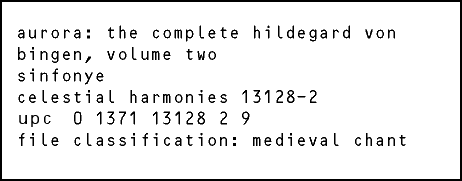 |
||||||||||||||||||||||||||||||||||||||||||||||||
 
Für ihre Nonnen komponierte Hildegard (1098-1179),
visionäre Äbtissin, 77 liturgische Gesänge, deren
Tonumfang und melodischer Verlauf den Rahmen der damals gängigen
Gregorianik sprengten. Das australische Ensemble Sinfonye (Stevie
Wishart, Jocelyn West und Vivien Ellis) singt (wieder mit Mitgliedern
des Oxforder Mädchenchores) weitere 15 Lieder des Zyklus, den
Hildegard als „Symphonie der Harmonie der Himmlischen Offenbarungen“
betitelte. Der Solo- und Chorgesang entfaltet sich wie eine Zauberblume
mit überirdisch anmutender Leuchtkraft.
the project This is the second volume of The Complete Hildegard von Bingen. Hildegard von Bingen (1098-1179) was born the tenth child to a noble family and was dedicated at birth to the church. At age three she began to have visions of luminous objects, but soon realized she was unique in this ability and kept these visions secret for many years. Hildegard's religious education, which began at the age of eight, consisted of an ascetic life of prayer and contemplation. At a time when few women were accorded respect, she lived to become a highly respected writer, poet, composer and visionary sought after for her counsel by bishops, popes and kings. Images of aurora or dawn appear in many of Hildegard's songs as metaphors for the Virgin Mary and is implicit as the inner and outer energy in all virgins. This recording freely gathers those songs inspired by the young saint Ursula, the Virgin Mary, and the expressive spirituality of Hildegard's nuns. The songs are a celebration of virginity, but also would have been part of the general medieval belief that music had its own spiritual power, and that given the right conditions, could be heavenly. It was the music of virgins that Hildegard heard as celestial harmony. Virgins and widows represent the two groups of women in Hildegard's community. Perhaps these unique and difficult songs were composed specially for her nuns as a more personal expression of their devotional life rather than for use in church. This, the second volume ends with O pater omnium, which is more sombre than the exultant love lyrics of the virgins as brides of Christ. Here the language of love is more devout, its melody more poignant and the songs create a spiritual atmosphere that lingers beyond the distance of centuries. the artists Sinfonye, founded in 1987 by Stevie Wishart, and joined by Vivien Ellis, was conceived as an ensemble combining improvisatory skills derived from traditional music with performance practices recreated from historical research, with a particular interest in repertories sung, inspired or composed by women. Since its conception, Sinfonye has performed throughout Europe, North America and Australia. In addition to their group work, the members also maintain active solo careers. Stevie Wishart developed her musical studies at the University of York, the Guildhall School of Music and Drama, and, with a Vicente Caņada Blanch Fellowship, at New College, Oxford, where she is completing a D.Phil on medieval bowed instruments. Considering the distance from the 12th century to the present, Ms. Wishart's music maintains authenticity. Vivien Ellis, singer and voice workshop leader, joined Sinfonye in 1989. Her research into the roots of singing in Europe have taken her to Bulgaria, France, Spain and Corsica. Vickie Couper, Camilla Scarlett, Sara Stowe, Louise Eeckelaar, Emily Levy, Katharine Taylor and Lucy Steele, members of the Oxford Girls' Choir, join Sinfonye for this celestial celebration. tracklist
|
||||||||||||||||||||||||||||||||||||||||||||||||
|
|
||||||||||||||||||||||||||||||||||||||||||||||||
 |


